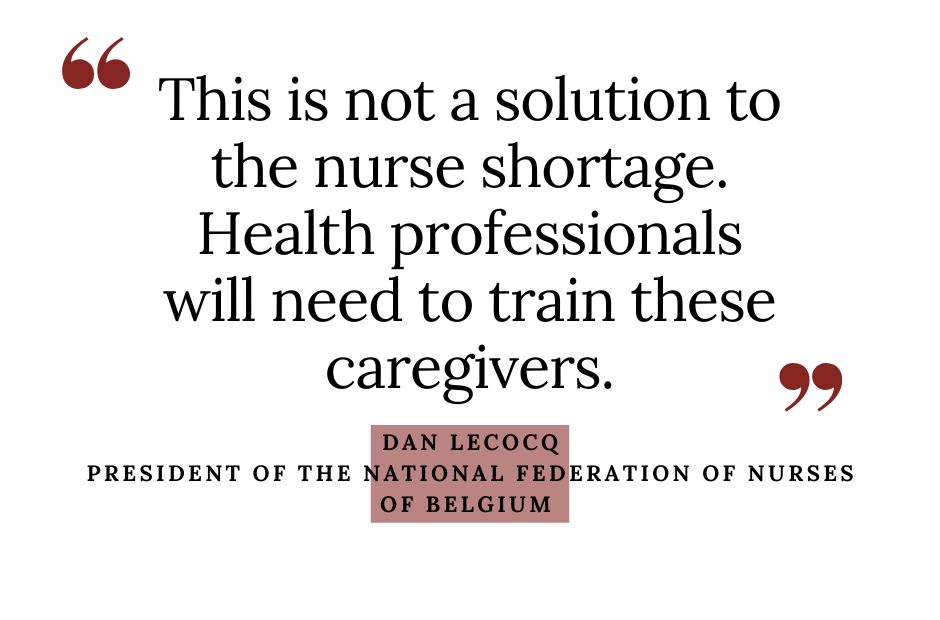The "qualified caregiver" bill, which was recently approved by the Belgian Government, will allow a patient's relatives to carry out certain care or administer certain treatments themselves. The status of 'qualified caregiver' will come into force at the end of September.
From now on, designated helpers (including teachers, scout leaders or relatives) will be able to carry out treatment such as helping a diabetic child perform an insulin injection, replacing a gastric tube or administering oxygen to a person suffering from cancer. The bill has received mixed reactions from the Belgian healthcare sector.
"This is a step forward for the quality of life of patients, and in particular chronic patients," said Health Minister Frank Vandenbroucke in a statement.
"We are delighted,” added Laura Danloy, psychologist at the non-profit association Aidants Proches de Bruxelles, in an interview with RTBF. "Family carers did not wait for this resolution to administer treatment, but it is positive because there is finally a legal framework in place."
License from a healthcare professional required
"This will allow patients to become more independent," Dan Lecocq, president of the National Federation of Nurses of Belgium (FNIB), told RTBF. "Even if for many, it is a regularisation of what already existed de facto."
To be recognised as a qualified caregiver and authorised to perform certain nursing acts, it will nevertheless be necessary to meet certain criteria. First of all, carrying out this care will always require a license from a nurse or doctor. These health professionals will need to determine what the qualified caregiver can do and for how long. Qualified caregiver status is assigned for the follow-up of a patient’s treatment over a period of time.
Some acts may be done simply based on instructions received. Others will require training.
The qualified caregiver may be a parent, educator, caregiver, teacher, or friend. Treatment can thus take place in a school, a nursery, a day centre, or an institution for disabled people, but not in a care establishment. During a summer camp, a scout leader can help a child reposition his gastric tube or give injections to a child with a motor disability.
Related News
- Breast cancer patients treated in unaccredited clinics face higher risk of dying
- Brussels hospital uses AI to detect acute conditions more quickly
For the Diabetes Association, the creation of this legal framework was a necessity. "For example, during extracurricular activities such as school trips or residential classes, diabetic children are still too often absent because of the difficulty in finding nurses available to administer insulin injections," Valérie Heuvelmans, a nurse at the Diabetes Association, told RTBF. "These children dream of simply being like their friends, of being able to do the same activities, without complications."
"It is positive that this framework makes it possible to support caregivers to enable them to carry out these acts safely," explained Caroline Legrand, coordinator of Jeunes Aidants Proches.
For the FNIB’s Dan Lecocq, the safety issue is a concern. "An act taken in isolation often looks simple. But you always have to think about all its implications from a global view. For example, placing a gastric tube, there is an impression that it is simple. But it's not. If it is positioned too high, in the respiratory system rather than in the digestive system, it could lead to the death of the patient."
"Will we be able to anticipate all the risks?" he continued. "Training is planned, but will health professionals succeed in sharing their expertise? There are a lot of things we do without putting words on them." The training and support of caregivers will therefore be a major challenge.
Health Minister Frank Vandenbroucke believes these advances will relieve the pressure on nurses and doctors. "They can be partially freed from tasks that a qualified carer can perfectly perform," he said in his statement.
But this is nothing to celebrate, according to the National Federation of Nurses of Belgium. "This is not a solution to the nurse shortage," said Lecocq. "Health professionals will need to train these caregivers."
"The risk is also that institutions such as day centres start to rely on educators to perform certain care to avoid hiring a nurse," he concluded. "This would then contribute to the de-skilling of health care."


